Planet President Shares Business Insights at Needham Investor Conference
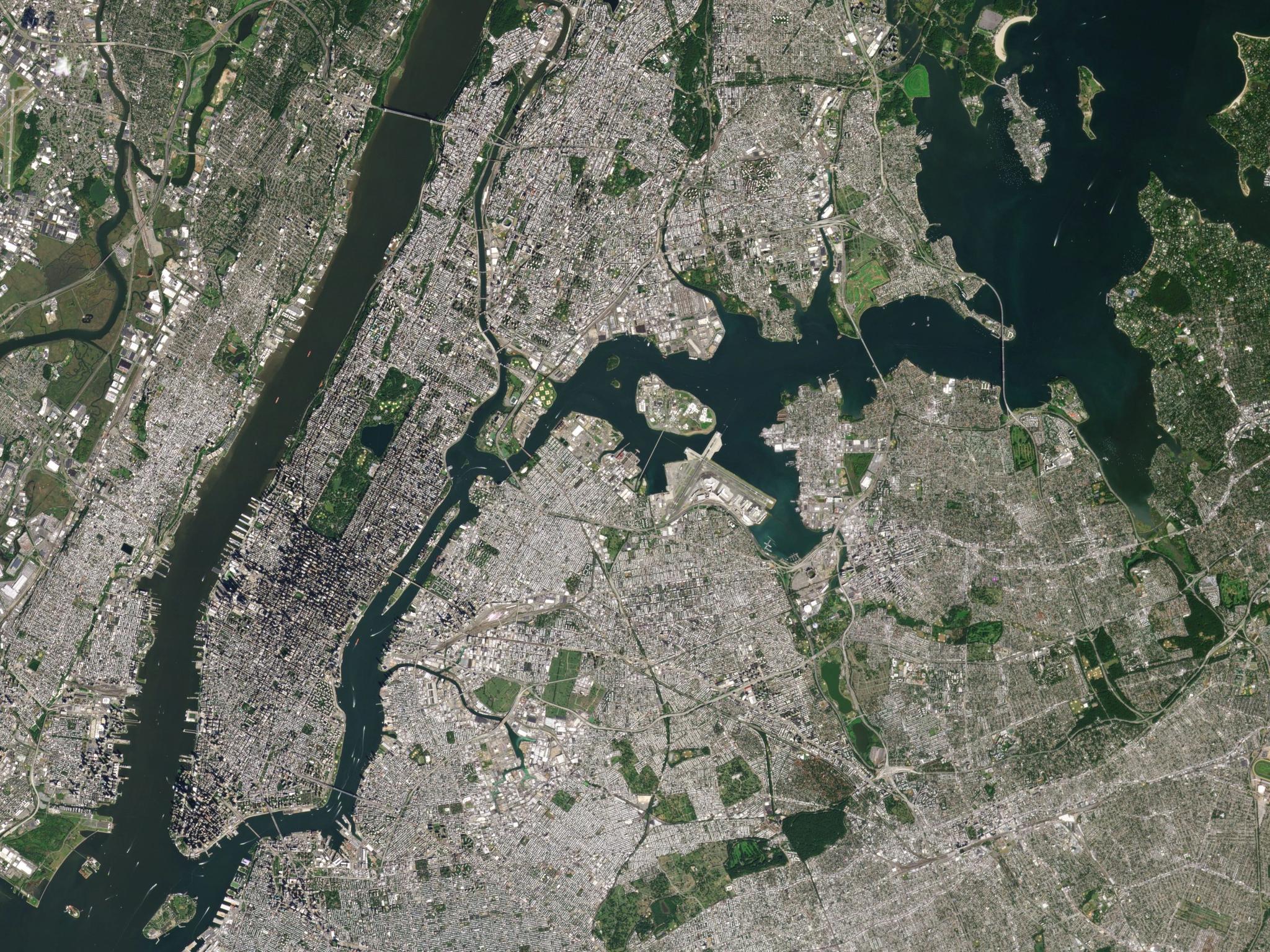
PlanetScope image of New York City. © 2021 Planet Labs PBC. All Rights Reserved.
NewsLast week, Planet President and CFO Ashley Johnson spoke at the Needham Investor Conference in New York City about Planet business and product innovation. In a fireside chat with Ryan Koontz, Needham’s Managing Director and Senior Equity Research Analyst for Communications & Space Sectors, Ashley shared key insights regarding the future of the business, including:
- New Space Tech: Satellite Innovation
- Market Differentiation: Understanding Unknown Unknowns
- Global Governments: Finding Value in Data
- Evolving Business: Operations and Partnerships
- AI: Advancing Human Understanding
New Space Tech: Satellite Innovation
Halfway into Ashley’s fireside chat with Ryan Koontz, she looked into the audience to see the two thumbs up from a member of the Planet Investor Relations team. “Satellite separation confirmed!” she said with an enthusiastic smile to Ryan. Planet’s newest high-res tasking satellite, Pelican-2, was launched into space on the SpaceX Falcon 9 rocket just about an hour or so earlier. Later in the day, Planet’s mission control made first contact with the released Pelican-2 satellite flying in orbit. Mission success.
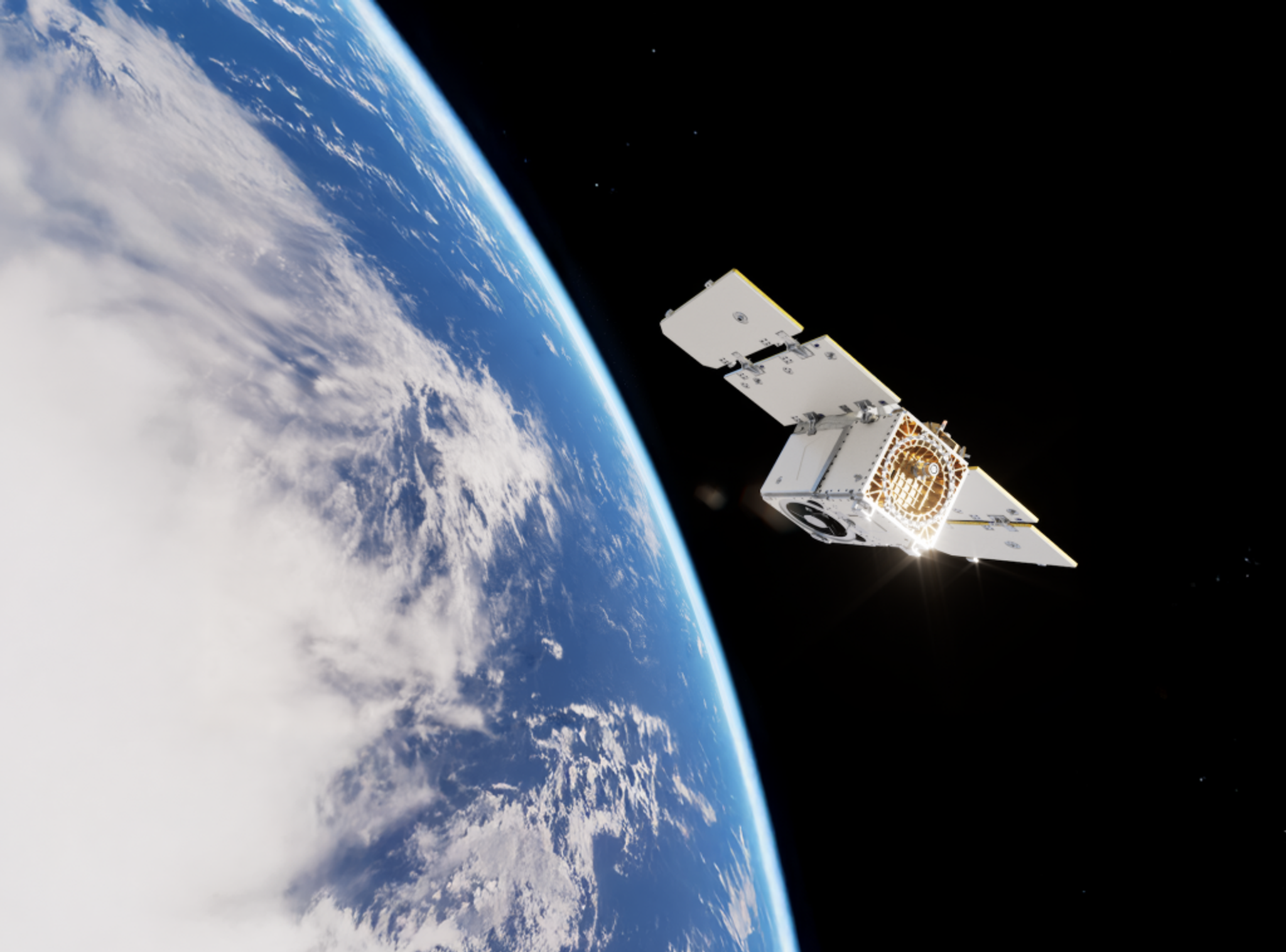
Planet rendering of Tanager and Pelican satellite bus.
Ashley proceeded to highlight this newest addition to the Pelican constellation, set to replenish our existing SkySat fleet. Pelican-2 is designed to provide up to 40 cm class resolution imagery and, notably, is equipped with the NVIDIA Jetson AI platform. This technology could enable customers to automatically learn if certain objects of interest are in the imagery data, such as ships or military infrastructure. With this advanced AI, the processing could happen right on the satellite and customers could be alerted with rapid speed. “Obviously, if we demonstrate the power of being able to do the compute at the edge, that could just take latency to a whole new level in terms of being able to communicate that data back down to Earth,” Ashley shared.
She also spoke about our hyperspectral satellite constellation, Tanager. Our first Tanager satellite, using the same Pelican satellite bus and a hyperspectral sensor made in partnership with NASA JPL and funded through our partnership with Carbon Mapper, was successfully launched into orbit this past summer and has already been delivering powerful hyperspectral data regarding CO2 and methane emissions. Ashley explained that Planet’s capabilities to develop novel space technology has been a powerful business opportunity for us in recent years. “It's an incredible demonstration of the capabilities of our space systems teams: taking a bus that we had built for one purpose, and being able to adjust it to embed a different sensor, and then demonstrating commercial value from it. The time frame that we're talking about here is like two to three years, not a decade. It's just really changing the game in space R&D and space operations.”
Market Differentiation: Understanding Unknown Unknowns
One of the key insights that Ashley shared was how Planet differentiates itself in the market. She opened with, “It's always great when you see competition coming into a market because it validates that this is a big opportunity, but I don't see anybody else who has really embraced the paradigm shift that we talked about.”
Planet’s combination of high-resolution tasking satellites with our medium-resolution daily scan of the Earth enables a new level of awareness. Ashley explained, “High-resolution data is great for the known knowns.” The tasker knows in advance that they want to view a specific site, perhaps a nuclear testing site. “The magic quadrant, though, is the unknown unknowns. Where are the places that I don't know to be looking for the activities that I don't know to be looking for?”
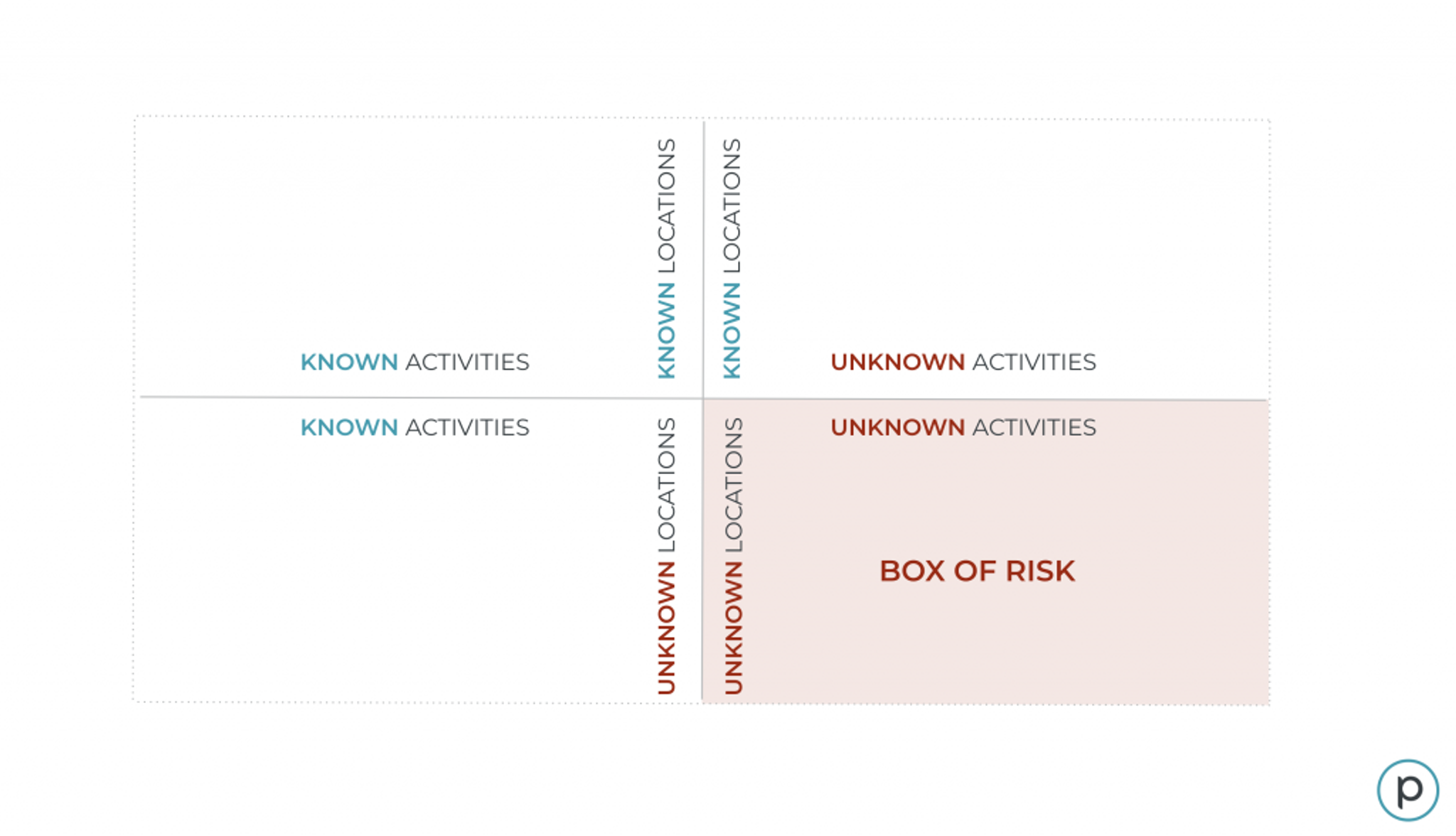
Planet graphic inspired by the Rumsfeld Matrix dividing knowledge and uncertainty into four quadrants. Ashley referred to how Planet’s daily scan helps customers gain information on the Unknown Unknowns quadrant, enhancing their awareness of activities on the Earth through a broad perspective.
Our customers are able to gain a wide, daily perspective of the world to inform their analyses through our PlanetScope medium-resolution scan. “You have areas that are very broad that you know you need to be monitoring, but you don't know exactly what you're looking for,” Ashley said, referencing our work with SCCON and the Federal Police of Brazil who gain a broad perspective of the vast Amazon rainforest with our data. With our scan, they are able to view previously unknown sites, get alerts about new roads or trees being felled in unpermitted areas, investigate with greater detail, and then send the police to address the environmental crimes.
Global Governments: Finding Value in Data
Ashley expanded on how Planet’s data is being leveraged by global governments, highlighting some of the newest deals with major departments and international governments. “Many of you will have noticed we renewed a $20 million per year contract with NASA, where we're providing data to all of the researchers in their community. That is a great opportunity for us. It's a bit more of a kind of all-you-can-eat for research purposes for these government entities.” On the security side, Ashley went on to reference two examples of eight-figure contracts with international customers that have recently expanded. “Those are discrete examples of Defense & Intelligence customers internationally that are spending large sums of money. We also talked about NATO doing a contract with us,” she continued.
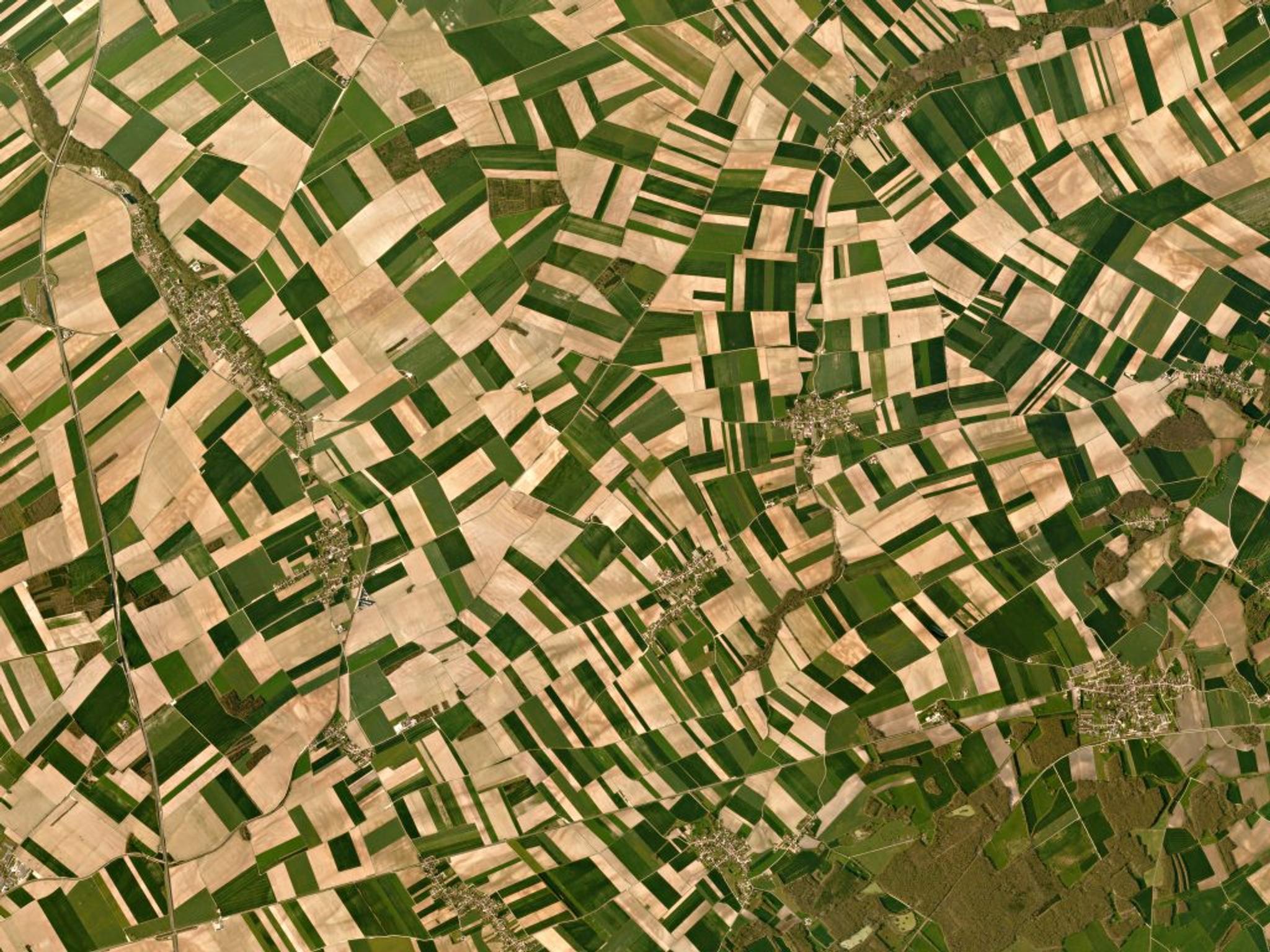
PlanetScope image of Agricultural fields in France.
Ashley shared how European governments have embraced Planet data to transform their sustainable farming industry. “In agriculture subsidy monitoring in Europe, they have the Common Agricultural Policy, where they want to incentivize certain sustainable tilling practices. They want to pay out these incentives to farmers that are complying, they need to monitor a whole country at a smallholder farmer level that requires our resolution of data and the ability to do it at a broad scale. We have a solution that we've worked with various partners to be able to deliver to them,” she said. “In other parts of the world, there are interests from governments in doing this. Agricultural subsidy monitoring is an area of opportunity for us in solution delivery to these end customers, as well as working with governments for natural resource monitoring, disaster planning and recovery, and built environment monitoring.”
Evolving Business: Operations and Partnerships
“New verticals, new applications,” Ashley said as she dove into what’s evolving and changing for Planet – from experimental new industries to more efficient business practices. “We work with insurance providers. We work in the energy sector. We've had some interesting outreach from the financial services sector and construction management,” she shared, noting that some of these are robust use cases and others are experimental. Ashley explained that Planet’s built a system offering automated access to sample data sets for industry experimentation. “We're changing our pricing model so that it enables a purchase at a lower data license in the experimentation phase and a usage-based model. And then an uptick when you move into that real commercial phase.”
Planet’s partner ecosystem has also advanced their capabilities in niche markets. Ashley noted that automated ship detection has been a growing industry for the company as unique partner relationships have built AI-powered solutions from our data. “One of the exciting areas for us on the defense and intelligence side are the wins that we've had in the maritime domain awareness space. That's really unique to Planet. This is using an application to understand movements of ships. Dark vessels and illegal fishing. Name your maritime domain awareness application. [Partners] built this application on top of PlanetScope, and we really are the only provider of this kind of open water data.”
Ashley explained, “This is an example of the types of partnerships that are really fruitful, where a partner has unlocked a lot of value from our data that otherwise we weren't focused on. We can co-sell into end customers globally. So that is the type of partnership and opportunity we want to lean into.”
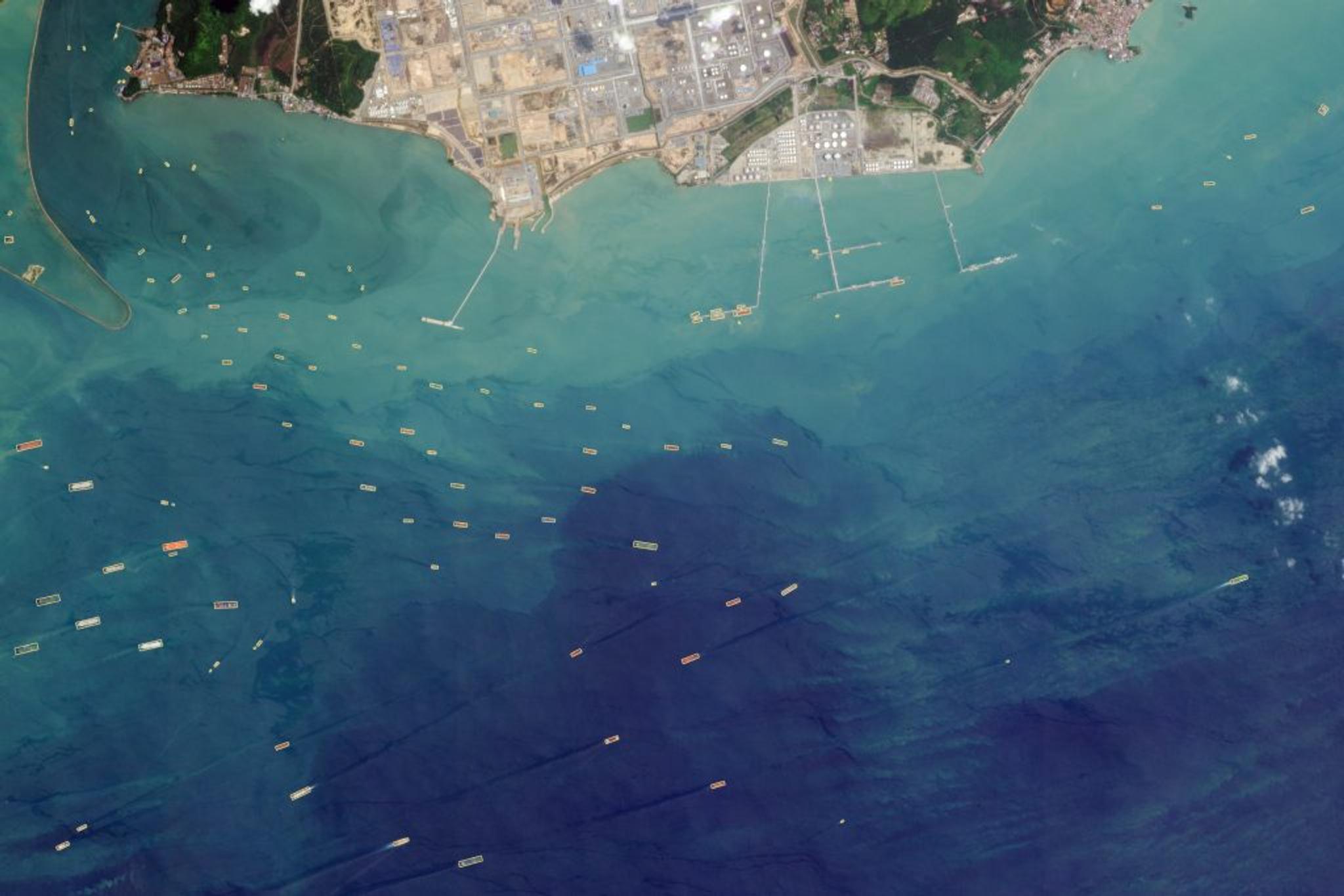
PlanetScope image of ships being detected off the coast of Singapore.
AI: Advancing Human Understanding
An overarching theme continued throughout the fireside chat: What does AI hold for the future of Planet?
“What AI is really starting to do is enable people who weren't Earth data engineers to know, What do I do to work with this data? How do I interface with it? How do I work with these other applications? And it can even walk you through how to work with our Planet Insights Platform. It's just broadening the user base for us, and that leaves open the opportunity for markets that we haven't even thought of for how our data can drive value,” Ashley explained.
“We are excited about the advancements in AI, and just the pace at which that's evolving could really impact our business. It can be anything from just assistance out in the field that is making it easier for our customers or our potential customers to code in geospatial data, all the way through to making these models smarter so that we can move into that unknown, unknown arena,” she expanded. “[It can] really make a difference in detecting where the next outbreak of famine might be, detecting where there might be movements that indicate hostile activity, the things that are really starting to impact or influence the major events that are plaguing our planet right now – whether that's just stability of countries and movements of people or the geopolitics that are creating a lot of friction.”
Ashley wrapped her thoughts with, “The more we enable that timely information, especially from the satellite through this edge compute, the lower the cost is to asking those questions and triggering that kind of feedback loop. The key is Planet is never sitting still.”
Forward-looking Statements
Except for the historical information contained herein, the matters set forth in this blog post are forward-looking statements within the meaning of the "safe harbor" provisions of the Private Securities Litigation Reform Act of 1995, including, but not limited to, the Company’s ability to capture market opportunity; whether and when the Company will be able to execute on its growth initiatives; how the Company will execute on its partnerships and contracts and how the Company’s partners and customers will utilize the Company’s data and product capabilities; and the Company’s future outlook. Words such as “expect,” “project,” “anticipate,” “intend,” “plan,” “seek,” “may,” “will,” “could,” “can,” “should,” “would,” “believes,” “potential,” “strategy,” “opportunity,” “aim,” “goal,” “benefit,” “continue,” “enable” and similar expressions or the negative thereof, or discussions of strategy, plans, objectives, intentions, outlook, assumptions, or goals, are intended to identify such forward-looking statements. Forward-looking statements are based on the Company’s management’s beliefs, as well as assumptions made by, and information currently available to them. Because such statements are based on expectations as to future financial and operating results and are not statements of fact, actual results may differ materially from those projected. Planet’s expectations and beliefs regarding these matters may not materialize, and actual results in future periods are subject to risks and uncertainties that could cause actual results to differ materially from those projected, including risks related to the macroeconomic environment, risks regarding Planet’s ability to forecast Planet’s performance and the other factors described under the heading “Risk Factors” in the Annual Report on Form 10-K filed by the Company with the Securities and Exchange Commission (SEC) and any subsequent filings with the SEC the Company may make. All forward-looking statements reflect the Planet’s beliefs and assumptions only as of the date of this blog post. Planet undertakes no obligation to update forward-looking statements to reflect future events or circumstances.

Ready to Get Started
Connect with a member of our Sales team. We'll help you find the right products and pricing for your needs.

